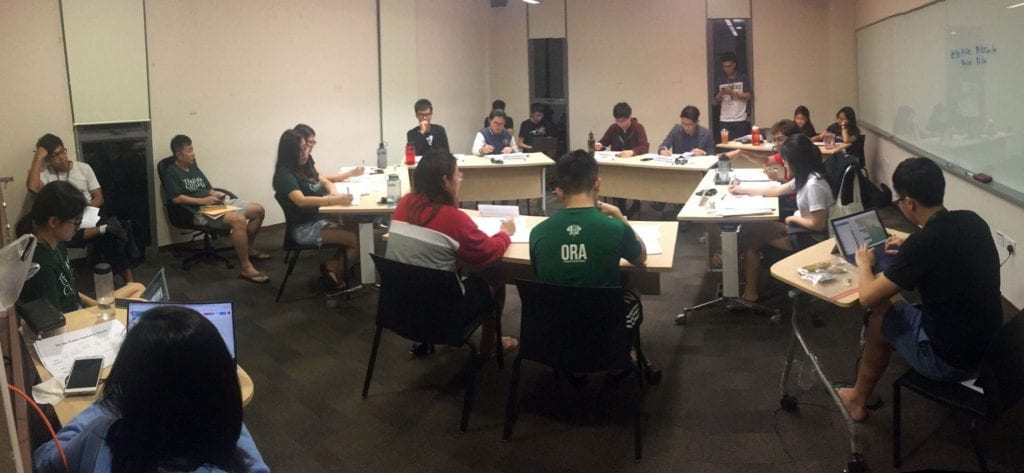KUAN Yee Han
Tembusu College
Yee Han discusses how he and his team continued to ensure active student engagement in his negotiation workshops when the course moved from a face-to-face to a fully virtual platform.

Photo courtesy of Kuan Yee Han
My colleague and I have organised a 3-day negotiation workshop for the past 8 years through face-to-face role-play negotiation simulations. The Heart of Negotiation Workshop is a Tembusu College Out-of-Classroom Learning (OCL) opportunity which caters to 30 students and 20–25 student coaches at the end of each semester. The workshop consists of 6 role-play simulations with multiple small and big group facilitations and debriefs. It is highly interactive and requires active student participation.

Photo courtesy of Kuan Yee Han

Photo courtesy of Kuan Yee Han
As the 17th iteration of our workshop took place during the COVID-19 outbreak, it could only be conducted online. This presented us with various challenges, from treading unfamiliar ground such as having to arrange for individual negotiation rooms in a time sensitive environment, to ensuring that all participants were able to have meaningful interactions despite the unfamiliar negotiation platform.
We wanted to ensure that the virtual learning experience would be comparable to that of a face-to-face workshop. Eventually, we settled on using a combination of the following online tools:
- LumiNUS for overall content and workshop management such as distribution of negotiation role sheets, reading materials and post-workshop surveys;
- Zoom for video conference teaching, polling, and negotiations with breakout rooms; and
- Google Docs/Sheets/Forms for ‘live’ sharing and collaborative documentation of coaching observations
We also reduced the number of participants to a more manageable group of 20 students. Nonetheless, there are undoubtedly differences between negotiating virtually and in-person.
Here are our three learning points from conducting the online negotiation workshop:
- We could mainly see our negotiating partners’ heads and upper torsos on the screen. Nuances of physical interaction such as body language, hand gestures or facial expressions were often missed, not to mention the difficulty in maintaining eye contact given that the computer camera and screen were not in sync. This was a key concern highlighted in many students’ feedback. Participants were also less able to experience the negotiating room environment—whether that be a light-hearted atmosphere or a palpable tension. Students also opined that the lack of opportunity to mingle and network limited the building of trust and rapport.
A potential intervention to build trust and rapport among the students is to incorporate elements of ice-breaker activities and small group sharing while waiting for the workshop to start. However, this does not fully address the nuances that are unfortunately missed out on in virtual meetings. This limitation would need to be addressed in future sessions.
- Technical difficulties are bound to happen. Difficulties such as an unstable internet connection, or the loss of audio/video feeds affected the flow and quality of online negotiations, which impacted the overall effectiveness of the learning experience.
On reflection, buffer time should be allocated to the schedule in anticipation of any potential technical difficulties.
- When online, students have the tendency to work on multiple screens, check their emails or phones, or be distracted by other off-screen matters. Several students shared that it was easy for them to be distracted and inattentive during the workshop, and it was challenging to overcome the urge to multitask.
The long hours negotiating in front of their computer screens could also strain the eyes and cause fatigue. Spacing out the programme with sufficient breaks can reduce the potential fatigue and allow participants to take time off the screen. However, we recognise that it does not fully address the multi-tasking behaviour.
Despite the challenges, feedback was positive and student engagement was meaningful throughout the three days. Student coaches were able to observe the participants “in a less intrusive manner” during the online negotiations by switching off their video feeds.
We observed that such online workshops allowed all participants to speak up and share their thoughts, as compared to discussing face-to-face in a big group which some found intimidating. Requesting students to unmute themselves during big group debriefs could encourage active participation and freer discourse, while recognising that there might still be sound distractions during the video calls.
Ultimately, this workshop provided opportunities for students to navigate the challenges of negotiating via video conferencing as it is likely that online negotiations will play a bigger part in our lives in the coming years. It provided a safe space for students to learn and adapt to virtual negotiations so that hopefully, they avoid potential pitfalls when they encounter similar situations in the future.
 |
KUAN Yee Han is a Senior Lecturer at Tembusu College and Assistant Dean of Students at the Office of Student Affairs. His research focuses on using authentic learning in higher education and living-learning communities. He teaches modules on negotiation and ageing. Yee Han also facilitates negotiation workshops and trains student coaches to promote out-of-classroom learning. He is a certified Lego® Serious Play® facilitator. Yee Han previously contributed a post on incorporating authentic learning activities in his module to inculcate empathy towards the elderly Yee Han can be reached at yeehan@nus.edu.sg. |

